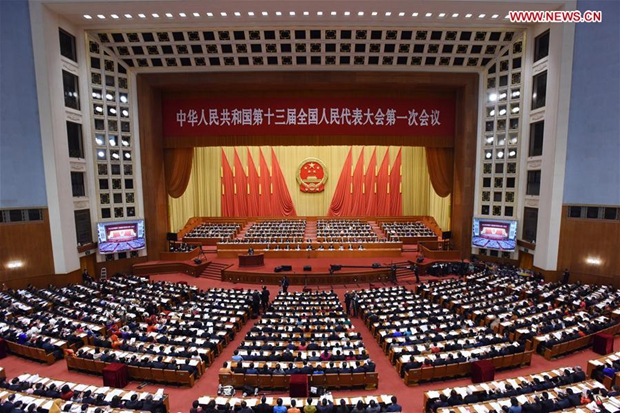?Two sessions chart China's future: Inward, outward and beyond
- By Eugene Clark
 0 Comment(s)
0 Comment(s) Print
Print E-mail China.org.cn, March 6, 2018
E-mail China.org.cn, March 6, 2018

The first session of the 13th National People's Congress opens at the Great Hall of the People in Beijing, capital of China, March 5, 2018. [Photo/Xinhua]
In March of each year, China holds its important political discussions that set the course for what lies ahead. These include the first session of the 13th National People's Congress (NPC) and the first session of the 13th National Committee of the Chinese People's Political Consultative Conference (CPPCC), and together are known as the "two sessions."
The first of these, the meeting of China's top advisory body, the CPPCC, comprises almost 3,000 members from all across China, including Hong Kong and Macao. It also includes experts from a range of fields who meet to discuss solutions and offer advice concerning state and government affairs. The CPPCC has no formal legislative power, but its soft power has grown in recent years thanks to greater attention over social media by government officials. As such, the CPPCC provides an important dialogue bringing the people's concerns to the attention of government.
The second of the two sessions is the assembly of the NPC, the body akin to the U.S. House of Representatives or the U.K./Australian Parliament. The NPC has the ultimate legal authority in China, possessing the sole power to enact legislation, amend the constitution, amend laws and oversee law enforcement. Moreover, the NPC appoints key state officials and administrative heads, including the officials in charge of China's judicial system.
The two sessions are important on three major levels.
First, they provide a window into China's internal situation. The two gatherings this year are the first annual sessions charged with implementing President Xi Jinping's ideas on "Socialism with Chinese Characteristics for a New Era," the principles of which were presented at the 19th National Congress of the Communist Party of China (CPC) last October.
This NPC session will also confirm those who will lead the coming changes. The NPC deputies will discuss and develop plans to meet the goals set in October. Among the topics likely to be discussed are:
?Plans to reduce poverty and deal with growing inequality
?Plans to tackle serious pollution
?Continued crack-down on corruption
?Continued economic development, especially of e-commerce and leveraging (for example, the "internet of things")
?The goal of becoming a future leader in industries such as artificial intelligence, robotics, biotech, nanotechnology and commercialization of outer-space
?Dealing with China's large private debt
?Improving efficiency and competition of state owned enterprises
?Meeting the needs of China's aging population and the need for a stronger social security system
?Plans to tackle problems with affordability and availability of housing
?Development of a more efficient transportation system
?Improvement of education at all levels, from pre-school to higher education
?Constitutional reform and the inclusion in the constitution of President Xi's thoughts
Secondly, looking externally, the two sessions will look at how China should meet the challenges inherent in its growing role as a world and regional leader. Continued emphasis will be placed on the progress of the Belt and Road initiative. China will also consider its defensive needs in a changing global context that includes renewed military build-ups in the U.S. and Russia.
Finally, internationally, given China's increasing importance in the world, many foreign governments alert to new policies or changes in direction will take a keen interest in the two sessions. African nations, for example, are watching carefully to see what lies ahead for Chinese engagement with the African continent. Many around the world will also be focused on what the sessions foreshadow in terms of China-U.S., China-EU and China-Russian relations. Furthermore, many developing countries will look to China for new models and lessons in economic development.
Eugene Clark is a columnist with China.org.cn. For more information please visit:
http://www.ccgp-fushun.com/opinion/eugeneclark.htm
Opinion articles reflect the views of their authors only, not necessarily those of China.org.cn.





